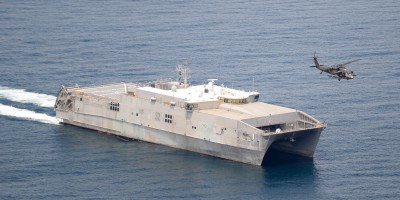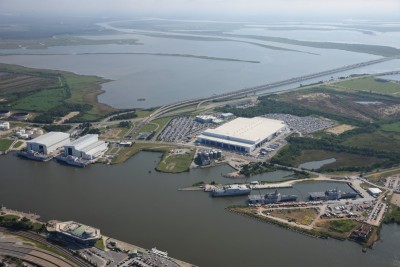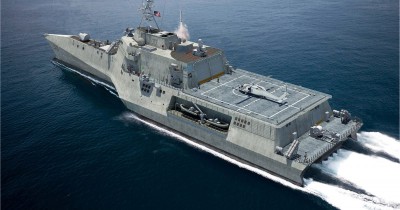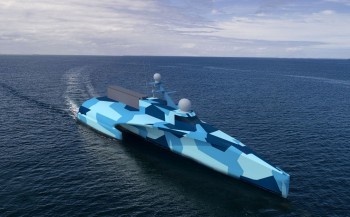Austal: Celebrating 20 years of Shipbuilding Operations in Mobile, Alabama
Friday 30 August 2019
Article by David Singleton, CEO, Austal Limited
Austal (ASX:ASB), the worlds’ largest aluminium shipbuilder and Australia’s largest defence exporter has as a unique, highly valued relationship with the United States of America and is celebrating 20 years of shipbuilding operations in Mobile, Alabama in 2019.
Just over a decade following the company’s establishment in Western Australia, Austal commenced shipbuilding in the USA, in 1999; initially pursuing commercial vessel opportunities including offshore crew transfer vessels and large, high speed aluminium ferries for Hawaii.
However, Austal quickly saw an opportunity to apply the design technology successfully developed for commercial platforms to naval ships and in 2005 the company was awarded a contract to construct the US Navy’s first Independence class Littoral Combat Ship (LCS), designed by Austal in Australia.
The US Navy saw the clear benefits of the Austal LCS’ trimaran hull and aluminium construction that offers superior speed, seakeeping, space and multi-mission capability - including the largest aviation deck of any US naval vessel, second only to (much larger) helicopter and aircraft carriers. Furthermore, the US Navy saw the benefits in engaging a world-renowned shipbuilder (from Australia) that had become the acknowledged leader in high-speed aluminium vessel design and construction to develop an entirely new shipbuilding facility that could deliver naval vessels more efficiently and cost effectively than traditional, existing (steel) shipyards.
The unique Independence-class LCS has become a true maritime icon, with a distinctive design and a shallow draft that allows the fast response to littoral (close coastal) threats anywhere around the world.
The 127 metre USS Independence (LCS 2) was delivered to the US Navy in 2009 and has since been active in various naval operations in South East Asia, redefining naval capability by enabling multiple mission ‘modules’, including Anti-Submarine Warfare (ASW), Anti-Surface Warfare (ASuW) and Mine and Inshore Warfare (MIW) to be quickly configured and loaded to vessels, for various missions, as necessary.
 Above: The Expeditionary Fast Transport (EPF) can move more than 300 embarked troops with equipment, vehicles and cargo and aviation support, at 35 knots.
Above: The Expeditionary Fast Transport (EPF) can move more than 300 embarked troops with equipment, vehicles and cargo and aviation support, at 35 knots.
The first EPF (originally called the Joint High Speed Vessel or JHSV) was delivered in 2012 and since then, ten (10) additional EPF’s have been added to the US Military Sealift Command (USMSC) fleet, serving in US Navy operations around the world. Two EPF’s are under construction and a further two have been ordered by the US Navy.
With a large passenger (troop) capacity, huge mission deck, aviation deck and a shallow draft, the high speed EPF provides fast, intra-theatre support and the efficient transportation of troops and equipment, vehicles and cargo to any port around the world.
With close to 4,000 employees, Austal USA is now the largest employer in Mobile, Alabama and with a total of 29 ships delivered since 1999, has grown to become the 5th largest shipyard in the United States. Austal has invested over US$418 million in the shipyard since 1999, which is delivering LCS and EPF contracts worth in excess of US$6 billion.
The shipyard is one of the most technologically advanced and efficient naval ship manufacturing facilities in the world, with production (and assembly) lines that have vessel modules moving through the facility as construction progresses, achieving greater productivity and efficiencies - and genuine cost savings for the customer.
 Above: Austal USA is the 5th largest shipyard in the USA, featuring the most modern and efficient vessel module manufacturing facility (MMF) in the world.
Above: Austal USA is the 5th largest shipyard in the USA, featuring the most modern and efficient vessel module manufacturing facility (MMF) in the world.
Austal’s USA shipbuilding operations engages more than 1,200 suppliers and contractors from across forty (40) states in the USA and around the world – including Australian companies such as VEEM and Ayres, who supply critical vessel components for the LCS program.
Austal is pursuing new opportunities in the USA, including the Future Frigate (FFG-X) Program for the US Navy. The company is one of five (5) shipbuilders down-selected by the Department of Defense to develop concept designs for the US Navy’s next generation of Frigates. A total of 20 ships is planned and the first vessel contract is expected to be awarded in 2020. Austal is proposing an ‘up gunned’ variant of the proven Independence-class LCS, which would be built at Mobile, Alabama.
 Above: Austal’s FFG-X concept, based on the Independence-class LCS
Above: Austal’s FFG-X concept, based on the Independence-class LCS
Austal USA has also recently showcased a number of forward thinking, customised surface ship solutions, including new autonomous Unmanned Surface Vessel (USV) concepts, at Sea Air Space 2019 in Washington DC (the USA’s largest annual defence exhibition).
The concepts included both medium and large catamaran and trimaran hull designs (30 to 110 metres length) that are driven by data analytics and incorporate artificial intelligence and machine learning. The new platforms are designed to meet the US Navy’s emerging and evolving autonomous requirements to provide the fleet with increased lethality and intelligence, surveillance and reconnaissance capability.
